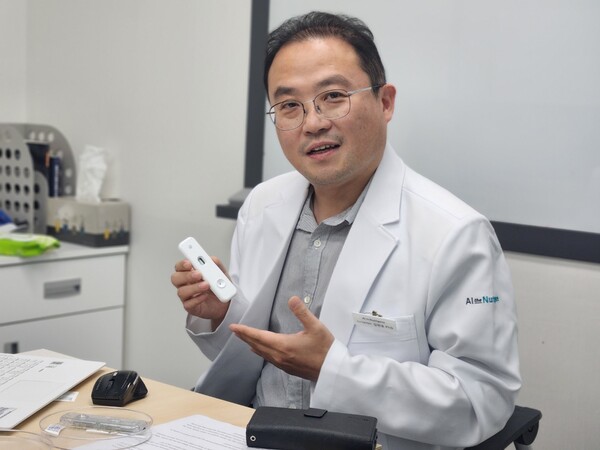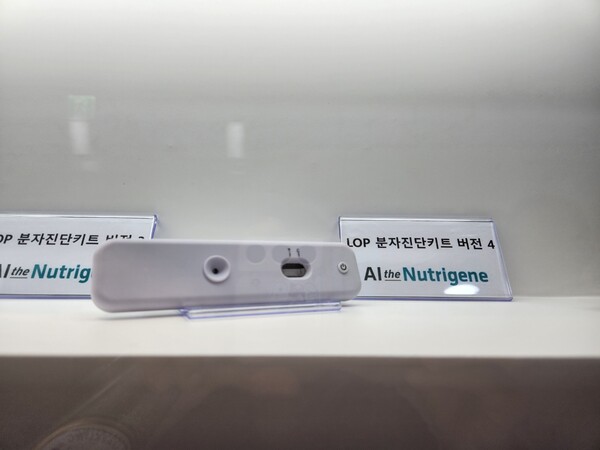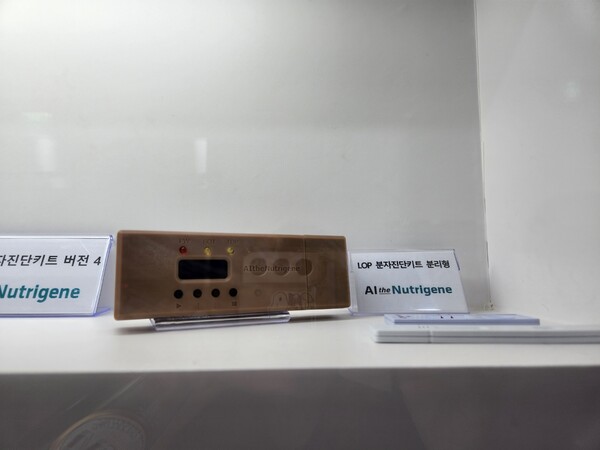Korea gained fame during the Covid-19 pandemic for its proactive response in producing Covid-19 diagnostic kits which greatly helped curb the spread of the virus within the country. Now, AItheNutrigene is trying to revolutionize the diagnostics field with its novel lab-on-paper (LOP) diagnostic kit.

The company’s bio division first studied nutrigenomics to produce health supplements and later started researching molecular diagnostic platforms which led them to the development of its current Covid-19 and Salmonella LOP point of care test (POCT).
Earlier this month, the company’s Covid-19 kit won export approval from the Ministry of Food and Drug Safety (MFDS), bringing it into the spotlight. However, the company still has a long road ahead to gain regulatory approval before these kits can be used in the intended countries.
AItheNutrigene Chief Technology Officer Kim Hyun-pyo spoke to Korea Biomedical Review in an interview on Monday about the company’s vision for the diagnostic kit.
Similar to rapid diagnostic kits but different under the hood
“It’s very similar to the Covid-19 rapid diagnostic test that you can buy in pharmacies but operates differently,” explained Dr. Kim. “Unlike PCR’s repeated thermal cycles which require large lab equipment, our test can perform the RNA amplification at one steady temperature in just 20-30 minutes.”
The LOP test aims to enable RNA amplification for greater diagnostic accuracy similar to PCR tests and gives a result in a short time similar to rapid diagnostic tests, thereby fusing the best of the two worlds into one device.

The amplification method is called loop-mediated isothermal amplification (LAMP) which uses three pairs of primers compared to one primer pair required for polymerase chain reactions (PCR).
However, the sampling method remains the same. After swabbing for a nose sample and mixing with the buffer solution, a few drops of the sample is inserted into the device and the flow of the sample is restricted by a wax barrier. The sample remains in the inserted compartment for 20 minutes which is the length of time required to amplify the RNA in the sample at 65 degrees Celsius. After 20 minutes elapses, the wax is melted at 95 degrees Celsius and the amplified RNAs are allowed to interact with gold nanoparticles to generate the positive or negative response on the test kit in a similar way to lateral flow assays in rapid diagnostic kits or pregnancy tests.
The assay is attached to a printed circuit board (PCB) which helps precisely control the temperature and subsequent flow of the sample fluid. He further explained that the device is powered by a universal C-type mobile phone charging cable.
Expecting regulatory hurdles
The company has already completed clinical performance tests through a local contract research organization (CRO) for the Covid-19 and Salmonella tests which respectively had high accuracies of 95 percent and 100 percent.
Accordingly, the data from the CRO was submitted to the Korean regulator and the company gained an MFDS export license for the Covid-19 test. Now, the company needs to get licensed in the particular countries they are targeting. However, he acknowledged that they still have a long road ahead of them to obtain approval.
He revealed that they plan to target low and middle-income countries (LMICs) starting with Southeast Asia where diagnosing viral and bacterial infections is a challenge due to a lack of budget, and later expanding to other areas where there is demand.
The CTO also noted that the clinical trials in the U.S. can be more challenging as it requires access to a Clinical Laboratory Improvement Amendments (CLIA) lab to compare its diagnostic kit with other POCTs, thus requiring a U.S. partner. In the EU, guidelines have become more stringent for in vitro diagnostics changing from the In Vitro Diagnostic Medical Device Directive (IVDD) to the In Vitro Diagnostic Medical Device Regulation (IVDR). Thus, he expects the approval can take as long as two years.
For this reason, he noted the need to partner with global pharmaceutical companies like Roche and Abbott or other global health organizations with diagnostic expertise in the targeted markets.
‘We have already received expressions of interest and are in discussions with these companies to help commercialize the product,” said Dr. Kim.
Pricing kits competitively while pursuing multiplexed POCT
Dr. Kim explained that the kit was developed for Covid-19 and Salmonella first as a proof of concept (PoC) to validate the platform for diseases caused by RNA-based viruses and DNA-based bacteria respectively. However, the company is running tests to also confirm the platform for other diseases such as tick or mosquito-mediated diseases such as dengue and Zika virus which have large disease burdens in tropical countries. They are also investigating other food-borne diseases such as norovirus and other food poisoning caused by specific bacterial strains such as staphylococcus and E-coli O157:H7 on the platform.
“Many other tests can be adapted to the same platform but will require specific primers,” explained the CTO.
Dr. Kim mentioned that they are also aiming to develop multiplex molecular diagnostic kits for sexually trasmitted infections and respiratory infections such as Visby Medical, which they consider to be competitors.
However, Visby Medical's PCR POCT kits are based on lab-on-a-chip (LOC) technology which uses expensive parts to produce a full 40-cycle PCR result but AItheNutrigene's kits are based on LOP technologies which can be sold at a quarter of the price.

“We are also developing a detachable prototype of the LOP POCT test kit so that the device consisting of the PCB and the other hardware can become reusable and sold for around $100 but the cartridges for specific tests can be bought separately for around $10.”
AItheNutrigene is currently focused on developing multiplex tests for flu A and B and Covid-19 and another for HIV-1 and HIV-2 but are still in the early stages of development.
He also mentioned plans to publish scientific papers within the next 6 months but the LOP POCT device already holds 52 patents to protect each part of the device including 10 international patents with the Patent Cooperation Treaty (PCT) and 42 Korean patents.
“Our goal is to add about 10 more patents by the end of this year with up to 100 patents in total including 30 PCTs for our LOP technology,” said Dr. Kim.

